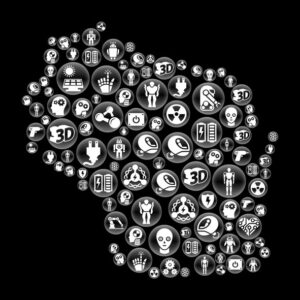Created by Ai Contributing Writer

AI is ushering in the next paradigm of development. And right now, we’re in a phase comparable to the early days of the internet in the 1990’s. The seeds of companies like Amazon, Apple, Facebook, Google, and Microsoft began to take root back then. The AI-equivalents of those companies are in their infancy right now, and venture capital firms like TitletownTech in Green Bay are looking for investments.
That means boom time. Dollars are flowing into AI as one of the most lucrative sectors, and paired with the potential for developments that were science fiction mere decades ago, the excitement surrounding this field is palpable.
Delafield-based Synthetaic is one AI company that’s got the attention of TitletownTech. Synthetaic uses rapid automatic image categorization (RAIC) that can look at large data sets and quickly perform deep analysis. This makes training and deploying AI software easier and faster. It also means greater accessibility for non-technical teams, effectively unlocking the power of large data set analysis and system design for everyone.
Any company or organization that can benefit from video, image, and geospatial data analysis can use the tools developed by Synthetaic to improve any number of metrics: output, efficiency, sales; the list goes on. The implications are enormous.





This includes AI applications specifically for farmers. Precision agriculture is a new term that in the context of dairy cows can mean applying machine learning and image recognition to closely monitor bovine health.
Image recognition identifies each specific cow and then labels its behavior throughout the day. Once the software is trained on normal behavior, it can then detect abnormal behavior: when a cow is sick it will spend more of its time lying down to rest. Precision agriculture can identify these sick cows so farmers can separate them from the herd and provide treatment.
That is just one application. The possibilities for AI in Wisconsin’s agriculture industry are limited only by the imagination of the AI engineers here.
That’s where you come in. Hitting the job market with a degree in AI opens up doors with any company that’s looking to implement smart solutions. Advancements in AI are going to touch every sector, and if you position yourself strategically, you’ll be there leading the way.
Machine Learning at the IceCube Neutrino Observatory
 Located at the Amundsen-Scott South Pole Station in Antarctica, construction of the IceCube Neutrino Observatory was originally proposed in 1999 and completed in 2010. This cubic-kilometer ice-house project represents the collaborative efforts of scientists, institutions, and universities from around the world.
Located at the Amundsen-Scott South Pole Station in Antarctica, construction of the IceCube Neutrino Observatory was originally proposed in 1999 and completed in 2010. This cubic-kilometer ice-house project represents the collaborative efforts of scientists, institutions, and universities from around the world.
However, it’s the University of Wisconsin-Madison that is the lead body responsible for the day-to-day management and maintenance of IceCube.
Neutrinos are subatomic particles that rarely interact with matter in a way we can measure. Most of the neutrinos we experience are produced as a result of nuclear reactions in the sun, and it’s an understatement to say that billions of them pass through you every second unnoticed.
However, a small percentage of neutrinos do interact with matter in a way that produces a small flash of light. This light can be amplified in a similar way that night vision goggles amplify light, at which point a neutrino detector can register a hit. Passing through greater amounts of matter increases the odds of a neutrino hit, which is why neutrino detectors are buried under hundreds of feet of ice. Hence Antarctica and IceCube’s 5,000-plus neutrino light detectors spread throughout a billion tons of ice.
For anyone going to school in Wisconsin, it’s already a huge privilege to have access to in-state-tuition rates at the school that’s in charge of the IceCube neutrino observatory, the largest of its kind in the world.
What’s even more exciting for Wisconsin students is that new advances in AI are opening up advanced avenues of study at IceCube.
In 2021, IceCube researchers found a way to improve the observatory’s neutrino detection with a machine learning technique known as convolutional neural networks (CNN). AI students will recognize that CNN is primarily used in image classification, notably pattern recognition.
CNN enables software to process hardware detections more rapidly. With the new CNN methodology IceCube is able to filter out noise from its neutrino detections by at least two orders of magnitude.
This frees up time and computing power that can improve IceCube’s detection processing overall. It also boosts the observatory’s sensitivity, enabling it to better detect neutrinos from sources outside our solar system – it’s also orders of magnitude more interesting scientifically.
As an AI student, you have to cut your teeth on something. In Wisconsin you have the unique opportunity to add neutrino observatory to your CV.
AI Jobs in Wisconsin
The CEO of the Wisconsin Center for Manufacturing and Productivity says he thinks AI has the potential to revolutionize the manufacturing industry the same way robotics and automation did.
AI jobs in Wisconsin come in all shapes and sizes. The state’s biggest sectors like healthcare, agriculture, and manufacturing are being transformed, and they’re not the only ones.
AI will replace some jobs, augment others, and enable entirely new advancements we haven’t even thought of yet.
Artificial Intelligence Jobs in Milwaukee
The executive director of the Northeast Wisconsin Manufacturing Alliance says that manufacturers are using natural language algorithms to develop marketing strategies, write emails, and draft reports. Using AI in these kinds of basic business capacities has been shown to save between one and 10 hours per week.
AI-enabled predictive analysis is also being used in the medical profession to forecast the efficacy of treatments and the likelihood of disease recurrence. Doctors are using image recognition to analyze x-rays and CT scans with the goal of confirming diagnoses.
The Medical College of Wisconsin uses AI to improve treatment for patients with pancreatic cancer and children with epilepsy.
Some Wisconsin businesses have already incorporated AI to such an extent that a new job category has been created. Prompt engineers are now responsible for writing inputs for generative AI to create highly-optimized solutions.
In general, skills in data science, robotics, natural language processing, computer science, machine learning, and image recognition will go a long way. In fact, as AI becomes ubiquitous throughout Wisconsin, simply being familiar with AI will be considered a significant leg up.
The CEO of the non-profit advocacy organization Milwaukee Tech Hub Coalition says that people who can successfully apply AI in their jobs are going to be the most productive going forward into the future.
AI Companies in Madison and Milwaukee
Madison-headquartered DataChat is a generative AI platform that’s currently 37 employees strong. It takes a similar approach to Synthetaic in that its solutions are designed for people who don’t necessarily have computer programming or coding skills.
DataChat puts generative AI at the fingertips of anybody capable of typing into a chat box. Through this innovative approach, anyone who needs to crunch data can use the power of AI through a chat-based interface.
Large language models are what’s under the hood at Layer Health. This healthcare AI company is backed by millions of venture capitalist dollars and aims to bridge the gap between healthcare and information.
Froedtert & the Medical College of Wisconsin is an early adopter of Layer Health’s services, which uses AI to analyze chart data.
Madison-based RedFox AI is a startup that also concentrates on the medical industry. The company focuses on developing technology that uses conversational AI to help people navigate medical testing processes, following in the model of popular tools like Alexa and Siri. The company is looking to make cancer screenings and the administration of medication seamless and easy for patients and clinicians.
AI is transforming Wisconsin, and that’s apparent whether you’re a bovine veterinarian or family doctor. Learning foundational skills in this field will prepare you for the jobs of tomorrow.
AI Salary in Madison, Kenosha County, St. Croix County, and Pierce County
Using 2022 data from the US Department of Labor for computer and information research scientists, it’s apparent that salaries for AI professionals varies based on location. Statewide, the average was $130,610 that year. In the greater Chicago metro area, which includes Kenosha County, it was $117,760. Close behind was the metro Minneapolis-St. Paul region that includes St. Croix and Pierce counties, where the average was $115,980. Outdoing both these areas is Madison where that number is significantly higher at $131,410.
Statewide, top earners for this category in the 90th percentile earned $175,440 or more in 2022.
Artificial Intelligence and Machine Learning Master’s Degree and Certificate Courses in Wisconsin and Online
AI is a new field, but Wisconsin’s colleges and universities are adapting fast.
- Waukesha County Technical College opened its new AI innovation center in fall 2024. It already offers AI certificates and launched its first associate degree in AI in tandem with the debut of the innovation center.
- UW-Madison is home to professors who specialize in fields like computer science and data science, not to mention those involved with the Amundsen-Scott South Pole Station IceCube project.
You can also find plenty of schools nationwide offering online programs in AI with options to specialize in a range of relevant concentrations.
Machine Learning Degree and Certificate Options in Madison and Milwaukee
The UW-Madison has a machine learning faculty concentration group that supports the school’s BS in computer engineering with a machine learning and data science option. The school’s MADLab is dedicated to developing next-gen machine learning and is supported by the US Air Force.
The UW-Madison also hosts an MS degree in electrical and computer engineering with a machine learning and signal processing concentration.
The University of Wisconsin Milwaukee offers a graduate certificate in AI and machine learning through its College of Engineering and Applied Science.
AI Robotics Degree and Certificate Options in Madison and Waukesha County
UW-Madison offers several courses in robotics that can be integrated into multiple undergraduate and graduate degree pathways.
Waukesha County Technical College offers an associate degree in automation systems technology.
AI Computer Science Degree and Certificate Options in River Falls, Madison, and Statewide
The University of Wisconsin-River Falls offers a bachelor’s degree in data science and predictive analytics, while UW-Madison offers an MS in data science.
Many state schools offer undergraduate or graduate degrees in CS, including UW-Madison, the UW-Stout, the UW-Whitewater, the UW-Oshkosh, the UW-Eau Claire, the UW-Milwaukee, the UW-Parkside, the UW-La Crosse, the UW-Green Bay, and the UW-Platteville.
AI Engineering Degree and Certificate Options in Madison and Statewide
The University of Wisconsin-Madison is your one-stop shop for computer engineering options, home to undergraduate degrees in electrical and computer engineering, and a Ph.D. in the field.
No surprise that it also hosts an MS in electrical and computer engineering with concentrations in ML and signal processing, power engineering, and research.
Several other in-state schools offer undergraduate degrees in computer engineering, including UW-La Crosse, UW-Stout, UW-Platteville, UW-Milwaukee, and UW-Eau Claire (software engineering).





